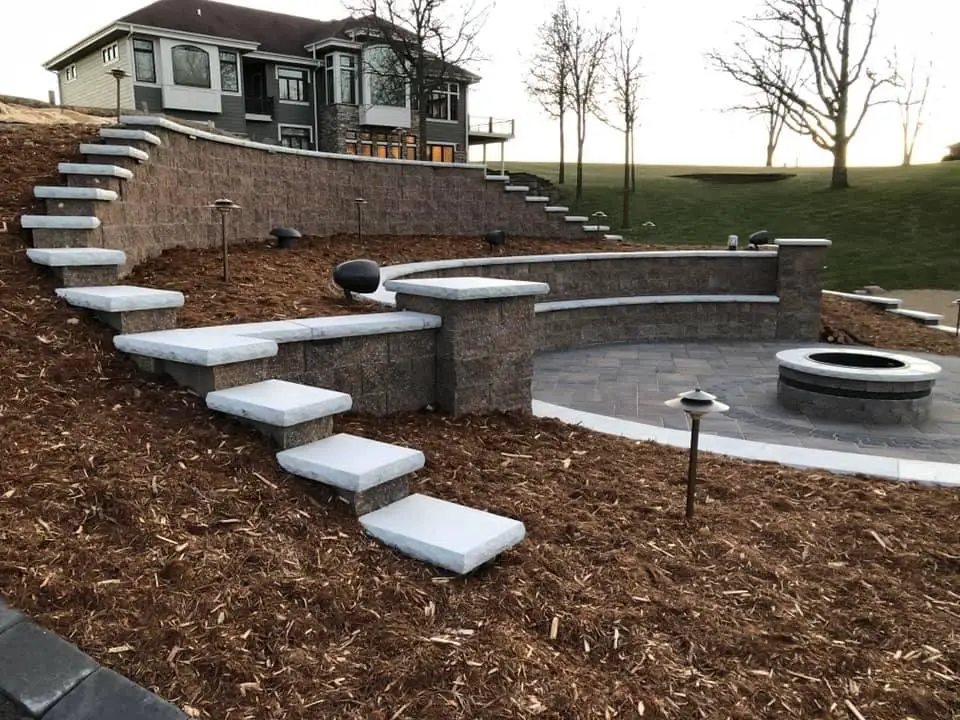To achieve proper landscape maintenance in Pennsylvania, you need to pay close attention to various factors that impact the health of your outdoor space. From soil testing for nutrient levels to selecting the right native plants and mastering watering techniques, each step plays an essential role in maintaining a thriving landscape. However, one key aspect often gets overlooked but is important in the overall maintenance process. You can elevate your Pennsylvania landscape’s health and visual appeal by effectively understanding and implementing this pivotal component.
Key Takeaways
- Choose native plants for low-maintenance landscapes in Pennsylvania.
- Adapt maintenance practices to suit the local climate.
- Regularly inspect plants for signs of stress or disease.
- Properly watered plants are used to prevent over- or under-watering.
- Consult professionals for specific plant care advice in Pennsylvania.
Soil Testing for Nutrient Levels

Conduct regular soil testing to assess nutrient levels accurately to guarantee peak landscape health. Soil health is essential for maintaining a vibrant landscape.
By implementing proper nutrient management practices, you can ensure that your soil provides the necessary elements for your plants to grow strong and healthy. Nutrient management involves analyzing the current nutrient levels in your soil and making informed decisions about any necessary amendments.
Through soil testing, you can determine your soil’s pH levels, nutrient deficiencies, and excesses. This information allows you to tailor your fertilization approach to meet the specific needs of your landscape, promoting excellent growth and overall health for your plants.
Regular soil testing is foundational to achieving a successful and sustainable landscape.
Proper Lawn Care Techniques

Implementing appropriate lawn care techniques is essential for ideal lawn health and appearance. When mowing, remember not to cut more than one-third of the grass blade at a time to prevent stress on the lawn. Regularly changing the mowing pattern can help prevent soil compaction and promote even growth.
Effective weed control involves prevention methods such as maintaining a healthy lawn and targeted weed removal as needed. Fertilizer application should be done strategically, following soil test recommendations for the right nutrients at the right time.
Proper irrigation techniques include watering deeply but infrequently to encourage deep root growth and reduce water wastage. Incorporating these practices allows you to maintain a lush and healthy lawn in Pennsylvania.
Choosing Native Plants Wisely

When selecting native plants for your Pennsylvania landscape, consider their benefits, such as improved biodiversity and reduced water usage.
Assess your garden’s soil type and sunlight conditions to guarantee the chosen plants will thrive.
Additionally, please familiarize yourself with the maintenance requirements of each native plant to effectively care for them in the long run.
Native Plant Benefits
Choosing native plants wisely for your landscape in Pennsylvania is essential for maximizing the benefits they provide and ensuring long-term success. When selecting native plants, consider the following:
- Pollinator Attraction: Native plants are vital for attracting pollinators like bees and butterflies, fostering biodiversity, and supporting the ecosystem.
- Wildlife Habitat: Native plants create habitats for various wildlife species, offering food and shelter essential for their survival.
- Water Conservation: Native plants have adapted to the local climate and soil conditions, requiring less water once established. This aids in water conservation efforts and reduces the need for irrigation.
Soil and Sunlight
Understanding each species’ specific soil and sunlight requirements is crucial to guarantee the successful integration of native plants into your Pennsylvania landscape. When choosing native plants, consider the soil drainage in your garden. Native plants like black-eyed Susans and butterfly weeds thrive in well-drained soil.
You can incorporate organic matter into the soil to improve drainage or create raised beds. Moreover, maximizing shade is essential for certain native plants, such as wild ginger or foamflower. These plants prefer partial to full shade conditions.
Maintenance Requirements
For ideal landscape maintenance in Pennsylvania, it’s essential to carefully select native plants that align with the region’s climate and soil conditions. When choosing plants, consider the following:
- Mulching benefits: Use mulch to retain moisture, suppress weeds, and regulate soil temperature around native plants.
- Pruning techniques: Regularly prune native plants to promote healthy growth, improve airflow, and maintain desired shapes.
- Fertilizer application: Apply appropriate fertilizers at the right time and in the correct amounts to support the growth of native plants.
- Weed control: Implement effective weed control measures to prevent weeds from competing with native plants for nutrients and sunlight.
Implementing Watering Strategies

Proper implementation of watering strategies is crucial for maintaining a healthy landscape in Pennsylvania. When selecting plants, prioritize those with high drought tolerance to reduce water consumption.
Consider installing efficient irrigation systems like drip irrigation or soaker hoses to deliver water directly to the root zones, promoting plant hydration while minimizing water waste.
To conserve water, water your landscape during the early morning or late evening to reduce evaporation. Monitor the soil moisture regularly to guarantee plants receive adequate hydration without overwatering.
Adjust watering schedules based on weather conditions to prevent waterlogging and promote healthy root growth. By implementing these watering strategies, you can sustain a vibrant landscape while being mindful of water conservation efforts.
Integrated Pest Management Practices

Regarding Integrated Pest Management Practices, selecting pest-resistant plants and introducing natural predators can be key strategies for maintaining a healthy landscape in Pennsylvania.
Choosing plants that are naturally resistant to pests can reduce the need for chemical interventions while promoting a thriving ecosystem.
Introducing beneficial insects or animals that prey on harmful pests can help keep populations in check without relying on synthetic pesticides.
Pest-Resistant Plant Selection
Selecting pest-resistant plants is essential for effective integrated pest management practices in maintaining a healthy landscape in Pennsylvania. When choosing plants for your garden, consider the following:
- Native Species: Opt for native plants as they’ve evolved natural defenses against local pests and diseases.
- Diverse Plantings: Plant various species to prevent the rapid spread of pests and diseases.
- Regular Monitoring: Monitor your plants closely for signs of pest infestation or disease development, allowing for early intervention.
Natural Predator Introduction
To maintain a healthy landscape in Pennsylvania, consider introducing natural predators as part of your integrated pest management strategy. Predator introduction is essential to ecosystem balance by promoting natural pest control and enhancing biodiversity. You can effectively control pest populations without harmful chemicals by attracting beneficial insects like ladybugs, lacewings, or spiders to your garden. These natural predators are a sustainable solution to keep pest numbers in check, ensuring a harmonious coexistence within your landscape. Enhancing the presence of these beneficial organisms not only aids in pest management but also contributes to your garden ecosystem’s overall health and resilience. Embrace the power of natural predators to create a thriving and balanced environment.
| Predator | Role | Benefits |
|---|---|---|
| Ladybugs | Aphid control | Natural pest control |
| Lacewings | Caterpillar control | Biodiversity enhancement |
| Spiders | General pest control | Ecosystem balance |
Seasonal Cleanup and Maintenance

Properly maintaining your landscape through seasonal cleanup and maintenance is crucial for preserving its health and aesthetics in Pennsylvania. To guarantee your landscape thrives, consider the following tasks:
- Mulching Techniques: Utilize organic mulch to retain moisture, suppress weeds, and improve soil quality.
- Pruning Methods: Regularly trim trees and shrubs to promote healthy growth and maintain a tidy appearance.
- Seasonal Fertilization: Apply fertilizers in spring and fall to provide essential nutrients for plant growth.
- Weed Control: Keep weeds at bay by pulling them regularly or using eco-friendly methods.
Frequently Asked Questions
Can Landscape Maintenance Be Automated in Pennsylvania?
Automated solutions can revolutionize landscape maintenance in Pennsylvania. Embrace efficiency benefits by implementing smart technology. You’ll save time and resources while ensuring your outdoor spaces remain pristine and well-maintained with minimal effort.
How Do I Attract Beneficial Wildlife to My Landscape?
To attract beneficial wildlife to your landscape, create a diverse garden habitat. Incorporate native plants, water sources, and shelter. Include flowering plants for pollinators and provide bird feeders. Maintain a balanced ecosystem to support wildlife health and diversity.
Are There Any Specific Regulations for Landscape Maintenance in Pennsylvania?
Adhering to regulations is essential when maintaining your landscape in Pennsylvania. Guarantee compliance with local ordinances to keep your outdoor space beautiful and compliant with the law. Stay informed to avoid any issues.
What Are the Best Resources for Learning About Sustainable Landscaping?
To learn about sustainable landscaping, explore resources like eco-friendly practices workshops and online courses on green technology. These avenues offer valuable insights and tools for creating environmentally conscious and aesthetically pleasing outdoor spaces.
How Can I Incorporate Art and Design Into My Landscape Maintenance Plan?
To infuse art into your landscape maintenance plan, think beyond traditional elements. Sculptures, mosaics, or custom-designed pathways can add flair. Seek creative inspiration from local artists or nature itself. Blend beauty with function for a truly artistic garden.

